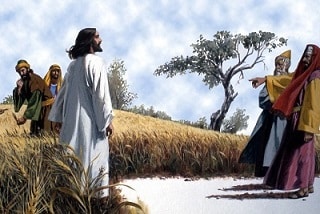 What is so very obvious in both of today’s readings for Mass, is God’s compassion toward Hezekiah in the first reading, and Christ’s compassion for his disciples in the gospel. Mercy is actually a better word for both situations, because this is what Jesus said in today’s gospel when the Pharisees accused him of allowing his disciples to pick grain on the sabbath:
What is so very obvious in both of today’s readings for Mass, is God’s compassion toward Hezekiah in the first reading, and Christ’s compassion for his disciples in the gospel. Mercy is actually a better word for both situations, because this is what Jesus said in today’s gospel when the Pharisees accused him of allowing his disciples to pick grain on the sabbath:
“If you knew what this meant, I desire mercy not sacrifice, you would not have condemned these innocent men.”
Jesus showed both compassion and mercy toward his disciples who were hungry and walking through a field of grain on the sabbath. Who wouldn’t have compassion for them? It would have been terribly hard walking through acres and acres of food when you are famished, and not be allowed to eat any of it. Rules do not make any sense if they do not serve the ultimate good of human beings. Rules need to be followed, but they can not cover every situation and sometimes a person needs to listen to their heart and not just their intellect.
Jesus did break the rules on rare occasions, like the one in today’s gospel. He also talked to a Samaritan woman at the well, healed on the sabbath, and defended an adulteress who by their own law should have been stoned to death. What is the familiar theme that is beginning to emerge from Christ’s acts of healing? Love, compassion, and mercy is the common theme that ran throughout Christ’s ministry. Not that he disregarded the rules entirely, as we can tell in today’s gospel, when he defended both his own actions and that of his disciples, by using the scriptures themselves:
“Have you not read what David did when he and his companions were hungry, how he went into the house of God and ate the bread of offering, which neither he nor his companions but only the priests could lawfully eat? Or have you not read in the law that on the sabbath the priests serving in the temple violate the sabbath and are innocent?”
Jesus stood up for his disciples and he is our advocate as well. The devil accuses us, but Christ defends us. His goodness is always stronger than the devil’s accusations. The Pharisees allowed evil into their hearts when they accused Jesus and his disciples of breaking the sabbath. Love did not rule in their hearts, because they were too busy finding fault with others. We should remember this the next time we go to find fault with others too.
We might not be exactly sure why the prophet Isaiah was sent to warn Hezekiah that he needed to get prepared to die. God knew he was dying and didn’t really have too much sympathy on him at the time, just wanted to make sure he put his affairs in order first. However, how could God’s heart not be touched when he heard Hezekiah’s desperate prayers and saw his bitter tears? God’s heart was touched and He relented. This happens a lot in the old testament. God is the ultimate ruler of the universe and yet, he changes His mind sometimes. He seems almost human at times, at least in His Spirit.
The beautiful ending of the first reading for Mass today, is also a very beautiful way to end this reflection on the scriptures. Did you notice that God told Isaiah to tell Hezekiah, that He would give him a sign that God would do what He promised He would do? What is beautiful about this, is the fact that Hezekiah was on his deathbed. He was too weak to do anything but lie in bed because he was on the verge of dying. So – God went to him, right where he was at. He made the sunshine that was shining on the steps go backward by ten steps, as a sign that he would arise from his deathbed and go to the temple once again. The miracle of the retreating sunshine was a miracle visible to Hezekiah, even in his weakened state, lying sick in bed. God reassured him by this sign.
God and Jesus both love us in the same way. Jesus goes to where we are at in life, to bring his love to us personally. This happens at Mass every Sunday, but also in the hospital or whenever we are seriously ill as well. The sacrament of the anointing of the sick is not just for people who are dying, but all those who are in a weakened state, much like Hezekiah.
At no point in our lives does Jesus abandon us. His love lives on through the hands and feet of our holy priests. They are the presence of Christ to the sick and the dying. What a comfort it is to know that you are not alone. Jesus never leaves our side, and neither does the holy Catholic church. We journey this way together, and it is a beautiful thing.
Daily Mass Readings:
Isaiah 38: 1-6, 21-22, 7-8 / Psalm (Isaiah 38) / Matthew 12: 1-8
